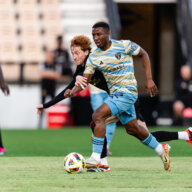For anyone who has kept up with the Philadelphia Flyers in 2019-2020, it isn’t a surprise when you hear “the Flyers are so much better at home.” There isn’t a shadow of a doubt the Orange and Black have been lethal in Philadelphia. For as great as the Flyers are at home (25-6-4), no one would guess that Philadelphia isn’t a .500 team on the road. On unfamiliar ice (16-15-3), the Flyers have only recently improved before the NHL suspended play. This only adds to the reason as to why the nine-game win streak before the league suspension was magical.
Special teams are a crucial element to the success of any hockey franchise. The Philadelphia Flyers have steadier numbers at home, which contributes greatly to that success. In saying that, to my surprise, the Flyers perform better on the powerplay while on the road. What becomes unstable is the stark contrast between Philadelphia’s success on the penalty kill at home versus away. This is where the Flyers struggle on the road.
As mentioned earlier, just before the NHL’s suspension of league play, the Philadelphia Flyers ended a nine-game win streak. During that win streak, the Flyers ascended the NHL Metropolitan Division standings. Currently second in the NHL Metropolitan Division, Philadelphia is only a single point behind the Washington Capitals. If the NHL began the playoffs after the suspension, the Flyers would have home-ice advantage against their first-round opponent. Their opponent would be the state rival Pittsburgh Penguins.
The home-ice advantage is incredibly important for the Philadelphia Flyers in this series against the Pittsburgh Penguins because the Flyers were only able to defeat the Penguins while in Philadelphia. In 2019-2020, the sole win that the Flyers hold over Pittsburgh, 3-0, was when Brian Elliott was between the pipes. Philadelphia’s defense was stingy, only allowing nineteen shots. The Flyers were perfect on the penalty kill but were unable to score on the powerplay in this particular game. In the following matchup in Pittsburgh, a 4-3 loss in overtime, the Penguins scored two goals on their powerplay.
Another key reason why home-ice advantage is important is specifically because of how the Philadelphia Flyers penalty kill is on the road versus at home. On the road, the Flyers penalty kill is 7.5% worse. That is a dive inefficiency. The special team numbers at home show 20.3% on the powerplay and 85.6% on the penalty kill. On the road, Philadelphia’s powerplay is 21.2% successful and the penalty kill is at 78.1%.
Against quality opponents, the Philadelphia Flyers have held their own. In this big potential playoff series, the Pittsburgh Penguins are one playoff team that the Flyers would benefit from having home-ice advantage against. The other team would be the Tampa Bay Lightning. If the regular season plays out after the NHL suspension, the goal would be for Philadelphia to pass the Lightning in points on the overall standings. If the Flyers can do that, they would have home-ice advantage against everyone except the Boston Bruins.
What’s the cherry on top of all of this? That would be the rate that the Philadelphia Flyers score shorthanded goals. At home, it happens more often. Claude Giroux has scored one of four shorthanded goals at home and the rest belong to Kevin Hayes. Praise Alain Vigneault for that signing and thank you New York Rangers for letting them come to the Flyers.



























